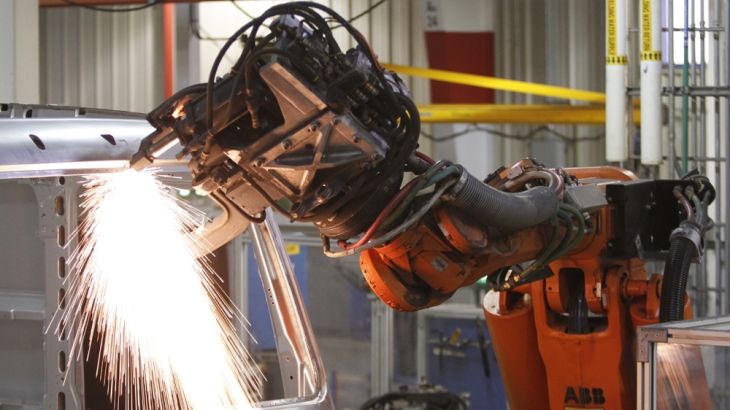
Robots: Job terminators or simply misunderstood?
We examine the role of robots in the workplace of the future.
Whether you are based in Washington or Beijing, automation anxiety is something that could be keeping you awake at night. What will the future of work look like if more and more companies replace humans with machines?
The leaders of two of the world’s biggest economies, US President Donald Trump and China’s Xi Jingping, met this week to discuss business and trade. They oversee a workforce of 900 million people.
Keep reading
list of 4 itemsParallel economy: How Russia is defying the West’s boycott
US House approves aid package worth billions for Ukraine, Israel
Ecuador weighs security, international arbitration in latest referendum
In the past, Trump has blamed China for taking US jobs. But economists say it’s the growing use of computers across all types of jobs and professions that’s really disrupting the workplace and our future job prospects.
More than a third of US jobs could be at high risk of automation by the early 2030s, according to a March report by PricewaterhouseCoopers. Jobs in transportation and manufacturing are most at risk. Education and healthcare are least likely to be affected.
There’s also an automation revolution under way in China which is now the world’s biggest buyer
of industrial robots.
Professor Reuben Mondejar at the City University of Hong Kong offers his take on the threat of automation in the global workforce.
While the United States and China should be worried about job automation, “it’s a reality that can be studied – it’s not going to come as a surprise. Automation has been coming to us for the past 20-25 years, it’s just going to be an intensity, rather than a surprise assault,” he says.
Countries will have to take into account the following: “Change in demographics, change in the combination of what are the consumer products that are attractive to certain countries, and the changing shifts of the nature of the economies,” says Mondejar.
Also on this episode of Counting the Cost:
Hollywood whitewashing: A new film, “Ghost in the Shell”, has attracted criticism for casting a white Hollywood star, Scarlett Johannsen, as an Asian heroine. As Rob McBride reports from Hong Kong, the controversy is all about box office receipts and the pulling power of western versus Asian actors.
South Africa finance: This week, South Africa‘s credit rating was downgraded to junk status by global ratings agency Standard and Poor (S&P). It acted after President Jacob Zuma fired a widely respected finance minister, Pravin Gordhan.
So what does “junk status” mean? It means that the company, or this case country in question, is in the kind of economic shape which will make it harder for it to repay debts. It doesn’t mean they won’t be able to, but there’s a risk they may not. Tania Page reports from Pretoria.
Commenting on Gordhan’s sacking, John Ashbourne of Capital Economics in London says, “it has thrown a lot of people into a bit of surprise”.
Meanwhile, the country’s newly appointed finance minister has been sending mixed messages on his next steps.
“Malusi Gigaba, in his first press conference both said that he’d radically transform the economy and also that he’d maintain policy continuity with what came before, which is obviously impossible,” says Ashbourne. “So, at the present time, it’s very difficult to know what changes, if any, will be made to a government policy in South Africa.”
Panama Papers: One year ago, the release of the Panama Papers exposed a hidden world where profits from corruption, tax evasion, and money laundering can legally be hidden. For the first time, we could see exactly the methods used by the rich and powerful to conceal their wealth from the authorities and the tax man.
The scandal brought down the Icelandic prime minister and forced other prominent people to explain why their names appeared in the documents. But, since then, has it become more difficult to legally hide wealth in tax havens?
Alex Cobham, chief executive of the UK-based Tax Justice Network assesses the legacy of the Panama Papers.
Indonesian cement plant: Farmers in Indonesia‘s Karst Mountains are angry about plans to build a large cement factory there. The company says it will bring thousands of jobs, but farmers argue the environmental cost will be far greater. And as Step Vaessen reports from Kendeng, they’re using an unusual form of protest, to make their point.